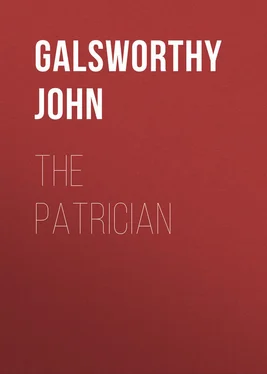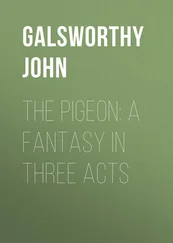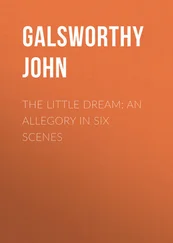John Galsworthy - The Patrician
Здесь есть возможность читать онлайн «John Galsworthy - The Patrician» — ознакомительный отрывок электронной книги совершенно бесплатно, а после прочтения отрывка купить полную версию. В некоторых случаях можно слушать аудио, скачать через торрент в формате fb2 и присутствует краткое содержание. Жанр: foreign_antique, foreign_prose, на английском языке. Описание произведения, (предисловие) а так же отзывы посетителей доступны на портале библиотеки ЛибКат.
- Название:The Patrician
- Автор:
- Жанр:
- Год:неизвестен
- ISBN:нет данных
- Рейтинг книги:5 / 5. Голосов: 1
-
Избранное:Добавить в избранное
- Отзывы:
-
Ваша оценка:
- 100
- 1
- 2
- 3
- 4
- 5
The Patrician: краткое содержание, описание и аннотация
Предлагаем к чтению аннотацию, описание, краткое содержание или предисловие (зависит от того, что написал сам автор книги «The Patrician»). Если вы не нашли необходимую информацию о книге — напишите в комментариях, мы постараемся отыскать её.
The Patrician — читать онлайн ознакомительный отрывок
Ниже представлен текст книги, разбитый по страницам. Система сохранения места последней прочитанной страницы, позволяет с удобством читать онлайн бесплатно книгу «The Patrician», без необходимости каждый раз заново искать на чём Вы остановились. Поставьте закладку, и сможете в любой момент перейти на страницу, на которой закончили чтение.
Интервал:
Закладка:
“Believe me, Lady Valleys, the warlike virtues are best left to men of more virgin imagination.”
He received a quick look, and the words: “Anyway, I’m sure you don’t care a rap for politics. You know Mrs. Lees Noel, don’t you? What a pretty woman she is!”
But as she spoke Courtier saw a young girl coming along the terrace. She had evidently been riding, for she wore high boots and a skirt which had enabled her to sit astride. Her eyes were blue, and her hair – the colour of beech-leaves in autumn with the sun shining through – was coiled up tight under a small soft hat. She was tall, and moved towards them like one endowed with great length from the hip joint to the knee. Joy of life, serene, unconscious vigour, seemed to radiate from her whole face and figure.
At Lady Valleys’ words:
“Ah, Babs! My daughter Barbara – Mr. Courtier,” he put out his hand, received within it some gauntleted fingers held out with a smile, and heard her say:
“Miltoun’s gone up to Town, Mother; I was going to motor in to Bucklandbury with a message he gave me; so I can fetch Granny out from the station:”
“You had better take Ann, or she’ll make our lives a burden; and perhaps Mr. Courtier would like an airing. Is your knee fit, do you think?”
Glancing at the apparition, Courtier replied:
“It is.”
Never since the age of seven had he been able to look on feminine beauty without a sense of warmth and faint excitement; and seeing now perhaps the most beautiful girl he had ever beheld, he desired to be with her wherever she might be going. There was too something very fascinating in the way she smiled, as if she had a little seen through his sentiments.
“Well then,” she said, “we’d better look for Ann.”
After short but vigorous search little Ann was found – in the car, instinct having told her of a forward movement in which it was her duty to take part. And soon they had started, Ann between them in that peculiar state of silence to which she became liable when really interested.
From the Monkland estate, flowered, lawned, and timbered, to the open moor, was like passing to another world; for no sooner was the last lodge of the Western drive left behind, than there came into sudden view the most pagan bit of landscape in all England. In this wild parliament-house, clouds, rocks, sun, and winds met and consulted. The ‘old’ men, too, had left their spirits among the great stones, which lay couched like lions on the hill-tops, under the white clouds, and their brethren, the hunting buzzard hawks. Here the very rocks were restless, changing form, and sense, and colour from day to day, as though worshipping the unexpected, and refusing themselves to law. The winds too in their passage revolted against their courses, and came tearing down wherever there were combes or crannies, so that men in their shelters might still learn the power of the wild gods.
The wonders of this prospect were entirely lost on little Ann, and somewhat so on Courtier, deeply engaged in reconciling those two alien principles, courtesy, and the love of looking at a pretty face. He was wondering too what this girl of twenty, who had the self-possession of a woman of forty, might be thinking. It was little Ann who broke the silence.
“Auntie Babs, it wasn’t a very strong house, was it?”
Courtier looked in the direction of her small finger. There was the wreck of a little house, which stood close to a stone man who had obviously possessed that hill before there were men of flesh. Over one corner of the sorry ruin, a single patch of roof still clung, but the rest was open.
“He was a silly man to build it, wasn’t he, Ann? That’s why they call it Ashman’s Folly.”
“Is he alive?”
“Not quite – it’s just a hundred years ago.”
“What made him build it here?”
“He hated women, and – the roof fell in on him.”
“Why did he hate women?”
“He was a crank.”
“What is a crank?”
“Ask Mr. Courtier.”
Under this girl’s calm quizzical glance, Courtier endeavoured to find an answer to that question.
“A crank,” he said slowly, “is a man like me.”
He heard a little laugh, and became acutely conscious of Ann’s dispassionate examining eyes.
“Is Uncle Eustace a crank?”
“You know now, Mr. Courtier, what Ann thinks of you. You think a good deal of Uncle Eustace, don’t you, Ann?”
“Yes,” said Ann, and fixed her eyes before her. But Courtier gazed sideways – over her hatless head.
His exhilaration was increasing every moment. This girl reminded him of a two-year-old filly he had once seen, stepping out of Ascot paddock for her first race, with the sun glistening on her satin chestnut skin, her neck held high, her eyes all fire – as sure to win, as that grass was green. It was difficult to believe her Miltoun’s sister. It was difficult to believe any of those four young Caradocs related. The grave ascetic Miltoun, wrapped in the garment of his spirit; mild, domestic, strait-laced Agatha; Bertie, muffled, shrewd, and steely; and this frank, joyful conquering Barbara – the range was wide.
But the car had left the moor, and, down a steep hill, was passing the small villas and little grey workmen’s houses outside the town of Bucklandbury.
“Ann and I have to go on to Miltoun’s headquarters. Shall I drop you at the enemy’s, Mr. Courtier? Stop, please, Frith.”
And before Courtier could assent, they had pulled up at a house on which was inscribed with extraordinary vigour: “Chilcox for Bucklandbury.”
Hobbling into the Committee-room of Mr. Humphrey Chilcox, which smelled of paint, Courtier took with him the scented memory of youth, and ambergris, and Harris tweed.
In that room three men were assembled round a table; the eldest of whom, endowed with little grey eyes, a stubbly beard, and that mysterious something only found in those who have been mayors, rose at once and came towards him.
“Mr. Courtier, I believe,” he said bluffly. “Glad to see you, sir. Most distressed to hear of this outrage. Though in a way, it’s done us good. Yes, really. Grossly against fair play. Shouldn’t be surprised if it turned a couple of hundred votes. You carry the effects of it about with you, I see.”
A thin, refined man, with wiry hair, also came up, holding a newspaper in his hand.
“It has had one rather embarrassing effect,” he said. “Read this
Courtier read a paragraph.
The man with the little eyes broke the ominous silence which ensued.
“One of our side must have seen the whole thing, jumped on his bicycle and brought in the account before they went to press. They make no imputation on the lady – simply state the facts. Quite enough,” he added with impersonal grimness; “I think he’s done for himself, sir.”
The man with the refined face added nervously:
“We couldn’t help it, Mr. Courtier; I really don’t know what we can do. I don’t like it a bit.”
“Has your candidate seen this?” Courtier asked.
“Can’t have,” struck in the third Committee-man; “we hadn’t seen it ourselves until an hour ago.”
“I should never have permitted it,” said the man with the refined face; “I blame the editor greatly.”
“Come to that – ” said the little-eyed man, “it’s a plain piece of news. If it makes a stir, that’s not our fault. The paper imputes nothing, it states. Position of the lady happens to do the rest. Can’t help it, and moreover, sir, speaking for self, don’t want to. We’ll have no loose morals in public life down here, please God!” There was real feeling in his words; then, catching sight of Courtier’s face, he added: “Do you know this lady?”
Читать дальшеИнтервал:
Закладка:
Похожие книги на «The Patrician»
Представляем Вашему вниманию похожие книги на «The Patrician» списком для выбора. Мы отобрали схожую по названию и смыслу литературу в надежде предоставить читателям больше вариантов отыскать новые, интересные, ещё непрочитанные произведения.
Обсуждение, отзывы о книге «The Patrician» и просто собственные мнения читателей. Оставьте ваши комментарии, напишите, что Вы думаете о произведении, его смысле или главных героях. Укажите что конкретно понравилось, а что нет, и почему Вы так считаете.












